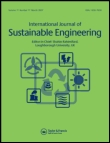
International Journal of Sustainable Engineering
Scope & Guideline
Advancing sustainability through innovative engineering solutions.
Introduction
Aims and Scopes
- Sustainable Engineering Practices:
The journal emphasizes innovative engineering solutions that enhance sustainability in various sectors, including construction, manufacturing, and energy. This involves research on materials, processes, and systems that minimize environmental impact. - Life Cycle Assessment and Environmental Impact:
A significant area of focus is on life cycle assessments (LCA) which evaluate the environmental impacts of products and processes from cradle to grave. The journal publishes studies that analyze and improve the sustainability of different materials and energy systems. - Renewable Energy Technologies:
Research on renewable energy sources, their integration into existing systems, and the development of new technologies for sustainable energy generation is a core aspect of the journal. This includes solar, wind, and bioenergy studies. - Circular Economy and Waste Management:
The journal promotes research on circular economy principles, emphasizing waste reduction, recycling, and the sustainable management of resources. Studies exploring the transformation of waste into valuable products are particularly relevant. - Digital Transformation and Industry 4.0:
The impact of digital technologies on sustainability practices within industries is a growing focus. This includes the application of Industry 4.0 concepts to enhance efficiency and reduce resource consumption. - Sustainable Supply Chain Management:
The journal covers research on sustainable practices within supply chains, addressing challenges and strategies for reducing environmental impacts while maintaining economic viability.
Trending and Emerging
- Smart and Sustainable Infrastructure:
There is an increasing focus on the development of smart infrastructure that integrates digital technologies to enhance sustainability. This includes research on smart grids, eco-friendly building materials, and energy-efficient urban planning. - Biomaterials and Eco-friendly Innovations:
Emerging studies on the use of biomaterials and eco-friendly innovations are gaining traction. Research in this area explores sustainable alternatives to conventional materials, particularly in construction and packaging. - Resilience and Adaptation to Climate Change:
Research addressing resilience and adaptation strategies to climate change impacts is becoming more prominent. This includes studies on infrastructure resilience, climate-smart agriculture, and sustainable water management. - AI and Machine Learning in Sustainability:
The application of artificial intelligence and machine learning to enhance sustainability practices is trending. This includes predictive analytics for resource management, energy optimization, and monitoring environmental impacts. - Community Engagement and Social Sustainability:
Emerging themes include the importance of community engagement and social equity in sustainability initiatives. Research is increasingly recognizing the role of public participation and social dimensions in achieving sustainable outcomes.
Declining or Waning
- Traditional Waste Management Approaches:
Research focusing solely on conventional waste management strategies is becoming less common, as emphasis shifts toward innovative waste-to-resource methodologies and circular economy principles. - Single-Focus Environmental Policies:
Studies that analyze environmental policies in isolation from socioeconomic factors are diminishing. There is a growing recognition of the need for integrated approaches that consider social, economic, and environmental dimensions together. - Static Energy Systems:
Research on traditional, non-renewable energy systems is declining as the focus increasingly shifts towards renewable energy innovations and sustainable energy transitions. - Basic Material Science without Sustainability Context:
Papers that explore material properties without a clear connection to sustainability objectives are appearing less frequently, as the journal favors studies that link materials science to sustainable applications.
Similar Journals

Green Chemical Engineering
Advancing sustainable solutions for a greener tomorrow.Green Chemical Engineering, an esteemed journal published by KEAI PUBLISHING LTD, plays a pivotal role in advancing the field of sustainable chemical engineering. With an Open Access policy since 2020, this journal facilitates the free exchange of cutting-edge research and innovations that address critical environmental challenges. Based in China, it has rapidly gained recognition with impressive category quartiles, ranking Q1 in numerous relevant fields including Catalysis, Chemical Engineering (miscellaneous), Filtration and Separation, and Process Chemistry and Technology. Its presence in Scopus highlights its significance, with top rankings (e.g., Rank #4/19 in Filtration and Separation) placing it in the upper echelons of chemical engineering literature. Designed for researchers, professionals, and students alike, Green Chemical Engineering aims to foster a collaborative platform for the dissemination of pioneering work that contributes to a greener and more sustainable future.

Engineering Reports
Empowering the engineering community with cutting-edge discoveries.Engineering Reports is a premier open-access journal published by Wiley, dedicated to advancing the fields of Engineering and Computer Science. Since its inception in 2019, this journal has rapidly gained recognition, achieving a commendable Q2 ranking in both the engineering and computer science categories in 2023, evidencing its impactful contributions to the scientific community. With an impressive Scopus rank of #70/307 in General Engineering and #63/232 in General Computer Science, the journal is well-positioned to disseminate cutting-edge research and foster innovation. Researchers, professionals, and students will find value in its comprehensive scope, which includes emerging technologies and interdisciplinary studies, making it an essential resource for anyone involved in these dynamic fields. Accessible online, Engineering Reports aims to bridge the gap between complex engineering theories and practical applications, enhancing collaboration and knowledge sharing globally.
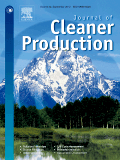
Journal of Cleaner Production
Exploring Interdisciplinary Approaches to Cleaner ProductionThe Journal of Cleaner Production, published by Elsevier Science Ltd, is a leading interdisciplinary journal dedicated to the development and dissemination of knowledge on environmental sustainability and cleaner production practices. With an impact factor that reflects its high relevance in the field, the journal is recognized as a Q1 publication in key categories including Environmental Science, Industrial and Manufacturing Engineering, Renewable Energy, and Strategy and Management as of 2023. This prestigious journal has been a platform for groundbreaking research since its inception in 1993 and continues to shape the dialogue around sustainable practices in various sectors. Researchers and professionals across disciplines can access its wealth of insights, which are critical for driving the transition towards more sustainable production and consumption models. The journal’s rigorous peer-review process ensures that only high-quality research is published, making it an essential resource for academics, industry leaders, and policymakers committed to advancing cleaner production methodologies.

Detritus
Pioneering research in environmental chemistry and engineering.Detritus, an esteemed open-access journal published by CISA PUBLISHER since 2018, serves as a vital platform for the dissemination of innovative research in the fields of Environmental Chemistry, Environmental Engineering, and Waste Management and Disposal. Based in Padova, Italy, the journal aims to foster scholarly communication and collaboration among researchers, professionals, and students dedicated to advancing our understanding of environmental challenges and solutions. With its open-access model, Detritus ensures that high-quality research is freely available, bridging the information gap within the scientific community. While currently categorized in the Q3 quartile across multiple environmental science disciplines, the journal is poised to further enhance its visibility and impact, contributing significantly to pressing global issues such as waste reduction and sustainable resource management. As the journal continues to evolve, it encourages submissions that advance theory and application in these critical areas.
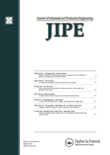
Journal of Industrial and Production Engineering
Pioneering Insights for the Engineering CommunityWelcome to the Journal of Industrial and Production Engineering, a premier academic publication dedicated to advancing the fields of Industrial Engineering and Production Engineering. Published by TAYLOR & FRANCIS LTD, this journal has established itself as a vital resource for researchers, professionals, and students seeking to enhance their understanding of engineering processes and systems. With an impressive 2023 quartile ranking of Q1 in Industrial and Manufacturing Engineering and Q2 in Control and Systems Engineering, the journal reflects a robust impact within its discipline, underscoring its commitment to disseminating high-quality, peer-reviewed research. Covering a comprehensive range of topics from optimization techniques to innovative production systems, the Journal of Industrial and Production Engineering not only facilitates scholarly dialogue but also fosters practical applications that address contemporary industrial challenges. Although not an Open Access journal, it continues to serve as an essential platform for sharing valuable insights within the engineering community.
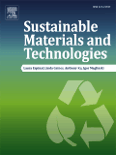
Sustainable Materials and Technologies
Exploring Innovative Paths to Material SustainabilitySustainable Materials and Technologies is an esteemed journal published by Elsevier, focusing on pioneering research and innovative solutions in the fields of industrial engineering, materials science, and environmental sustainability. With a prestigious Q1 ranking in multiple relevant categories—including Industrial and Manufacturing Engineering, Materials Science, Renewable Energy, Sustainability, and Waste Management—this journal is positioned as a leading platform for disseminating high-impact research that addresses pressing challenges in material sustainability. Recognized for its rigorous peer-review process and commitment to academic excellence, Sustainable Materials and Technologies is dedicated to providing open access to groundbreaking studies and practical methodologies that drive forward the agenda for a sustainable future. Since its inception in 2014, the journal has been integral for professionals, researchers, and students who are engaged in the quest for innovative materials and technologies that minimize ecological footprints. Join a community at the forefront of sustainability science by contributing to and engaging with the transformative research published in this pivotal journal.
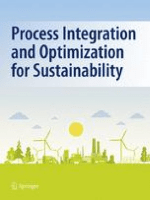
Process Integration and Optimization for Sustainability
Leading the Way in Sustainable Process EngineeringProcess Integration and Optimization for Sustainability is an esteemed journal, published by SPRINGERNATURE, dedicated to advancing knowledge in the realms of chemical engineering, environmental science, and sustainable development. Established in 2017, this journal provides a platform for rigorous research that addresses the critical challenges of integrating and optimizing processes to achieve sustainability goals. With a commendable Q2 category ranking across various disciplines such as Chemical Engineering, Control and Systems Engineering, and Geography, along with impressive Scopus rankings, it has quickly established itself as a vital resource for researchers, professionals, and students. The journal's focus on innovative solutions for pollution control, renewable energy, and effective waste management aligns with global sustainability objectives. For academics seeking to publish their findings or stay abreast of the latest advances in these areas, Process Integration and Optimization for Sustainability is an indispensable resource that promises to foster impactful discussions and disseminate vital knowledge within the academic community.

CT&F-Ciencia Tecnologia y Futuro
Empowering researchers through open-access insights.CT&F-Ciencia Tecnologia y Futuro, a distinguished open-access journal published by ECOPETROL SA, serves as a vital platform for the dissemination of innovative research and advancements in the fields of chemical engineering, energy, fuel technology, and the broader disciplines within the geosciences. Established in 1996 and operating continuously until 2023, this bilingual journal aims to foster collaboration and knowledge exchange among researchers, professionals, and students in Colombia and beyond. With an increasing emphasis on sustainability and renewable energy, CT&F aligns with contemporary academic priorities and societal challenges. Although currently ranked in the Q4 category across multiple disciplines, the journal remains committed to enhancing its impact and accessibility, providing researchers with valuable insights and a significant forum to share their findings, all under the auspices of open-access since 2009. Explore a wealth of research as you contribute to the ongoing dialogue shaping the future of science and technology.
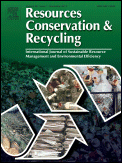
RESOURCES CONSERVATION AND RECYCLING
Innovating resource management for a sustainable world.RESOURCES CONSERVATION AND RECYCLING, published by Elsevier, is an esteemed journal that has been at the forefront of academic discourse since its inception in 1988. Focusing on the critical fields of resource management, recycling, and sustainability, this journal has established itself as a leading platform for innovative research, holding a prestigious position in the Q1 quartile for both Economics and Econometrics, and Waste Management and Disposal. With a remarkable Scopus ranking of #4 in its respective categories, it represents the pinnacle of scholarly contributions, aimed at fostering knowledge that drives efficient resource utilization and effective waste management practices. The journal's commitment to advancing the understanding of economic implications and environmental impacts of resource conservation is reflected in its diverse array of articles, case studies, and reviews. Although it is not an open-access journal, the valuable insights it offers are essential for researchers, professionals, and students who are dedicated to addressing pressing environmental challenges and enhancing sustainable practices on a global scale.

MRS Energy & Sustainability
Advancing Energy Solutions for a Sustainable FutureMRS Energy & Sustainability is a premier interdisciplinary journal published by SpringerNature, focusing on advancing the understanding of energy systems and sustainability within the context of materials science and engineering. Since its inception in 2014, this journal has rapidly gained recognition in the academic landscape, achieving impressive rankings including Q1 in Electronic, Optical and Magnetic Materials and Mechanics of Materials, and Q2 in Energy Engineering and Power Technology as well as Renewable Energy, Sustainability and the Environment, as of 2023. The journal's ISSN is 2329-2229 and E-ISSN is 2329-2237. With a commitment to open access, it provides researchers and professionals with the latest findings and insights essential for guiding innovations in energy solutions and sustainable practices. The journal's global reach and high-impact reputation make it an invaluable resource for scientists, engineers, and policymakers dedicated to addressing the contemporary challenges of energy and sustainability. With a diverse scope and high Scopus rankings, MRS Energy & Sustainability continues to be at the forefront of research that shapes our energy future.